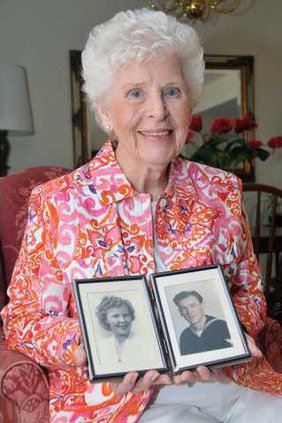On June 6, 1944, American soldiers stormed the beaches of Normandy in France to stake the Allies’ claim to Europe in World War II.
They came by air and by sea. Swimming to shore, carrying heavy supply packs and crawling along the sandy shores. Even under a shower of enemy fire they succeeded, but the cost was heavy.
American casualties numbered in the thousands, while the number of injured soldiers was even higher.
Thousands of miles away, 21-year-old Hilda O’Brien was completing her training stateside in the U.S. Cadet Nurse Corps.
“They needed nurses to take the place of the ones that became Army and Navy nurses because they didn’t have anyone to work (here),” said now Hilda Bell, a Gainesville resident.
“I was in my last year (of registered nurses’s training) when I joined the cadet corps. We did our training and then finished working in the hospital, taking care of the patients at Portsmouth Naval Hospital in Virginia.”
The corps was created by the Bolton Act in July of 1943. Although Bell was stationed in Virginia, the cadet corps had nurses positioned all over the country to work in military and civilian hospitals, health agencies and other related industries. The Division of Nurse Education was created under the U.S. Public Health Service department to oversee the corps.
A few months after joining the corps in May 1944, Bell learned that one of the first group of wounded D-Day soldiers would be leaving field hospitals and would arrive by ship to the Portsmouth hospital, now the Naval Medical Center of Portsmouth.
“We were told that the naval ship from D-Day was coming in. In order to have room for the those soldiers, we had to ship all of the veterans, (who were patients at the hospital), inland to other places,” Bell said.
“It was quite an ordeal. I was working in the laboratory at the time — it was way up in the tower of the hospital — so we could look out and see the ship coming into the port.”
Although they were forewarned about the ship’s arrival, nothing could prepare Bell and the other hospital personnel for barrage of new patients.
“They brought in the very, very sick soldiers first. Being a student nurse, I didn’t have anything to do with the really badly injured guys. But then they started bringing the others. They were still in pretty bad shape,” Bell said.
“It was just one right after the other — there were a couple of thousands. It was a big, big ship. It was wall to wall.”
With patients spilling out of rooms and into the hallways, Bell says the medical staff’s already long shifts became even longer.
“We worked long, long hours. The ship arrived in the early morning and they started coming into the hospital in the afternoon,” Bell said.
“It was a lot of work to get them off the ship. It was ambulance after ambulance — and buses. Those that could walk were all brought in on buses. It was way into the nighttime and they were still bringing them in.”
In addition to longer shifts, the nurses had to carry a heavier workload. On top of caring for their physical wounds, the nurses were also instructed to help make the wounded soldiers feel otherwise comfortable by getting the patients other things that they requested.
Topping the list of requests were the fresh fruit and other items that they couldn’t get while deployed overseas.
“They wanted milk and they wanted orange juice. We had these big pitchers that were almost too much for us to pick up if they happened to be full, but they didn’t stay full very long,” Bell said.
“We’d be pushing the carts that had maybe 10 of those pitchers on them, and we’d just keep on pouring.”
Another popular item for the soldiers was the telephone.
“They did put in a bunch of extra telephone lines for the fellas to use, but it still wasn’t enough. They were calling their parents and wives and girlfriends — people they hadn’t talked to in months,” Bell said.
“It was very emotional because they had limited time on the phone. It was heartbreaking to have to knock (a call) off, but we had to because the next one had to have a turn.”
In exchange for the corps paying for their training, a living stipend and uniforms, nurse corps participants had to pledge to actively serve for the duration of the war. Since World War II ended in 1945, Bell was free to live her life as she pleased, which included getting married, raising three daughters and working in her field.
Even though the hours were long and her training included going through hours of daily marching drills, Bell still remembers her days in the corps fondly.
“There were some rough times, but I liked my time down there,” said Bell, who grew up wanting to follow in the nursing footsteps of her mother.
“It was a nice place.”

